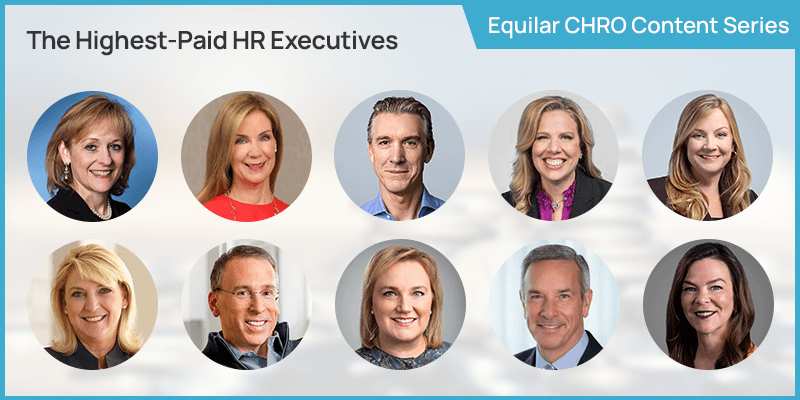The Highest-Paid Human Resources Executives
Redefining HR Leadership
July 1, 2024
Joyce Chen

The Equilar CHRO Content Series offers insights and trends related to top HR officers among the largest U.S. companies. This installment examines the highest-paid human resources executives at Equilar 500 companies in 2023.
The human resources (HR) department is responsible for managing the employee experience from start to finish, encompassing tasks such as recruiting and staffing, compensation and benefits, and ensuring safety and compliance. At the helm sits the human resources executive, who possesses a comprehensive understanding of all HR functions and applies this knowledge to align the department’s operations with the company’s long-term growth and stability. Serving as a crucial link between the HR department and the rest of the C-suite, HR executives—often chief human resources officers (CHROs)—ensure compliance with labor laws and bring extensive expertise to the table.
The traditional HR executive held a more reactive role, primarily focusing on administrative tasks and assisting employees upon request. This approach often led to the HR department operating separately from the company, which sometimes resulted in misalignment with the company’s strategic vision.
The present, redesigned role of the HR executive is more strategic, with a focus on the long-term vision of the company. This modern approach emphasizes aligning the company’s needs with employee output, ensuring a cohesive and productive workforce. It is key for the HR executive to communicate with the CEO to develop and implement programs that enhance employee performance.
The future of the HR executive encompasses increased challenges in maintaining talent in a competitive and ever-changing market. As advocates for employees, it is expected that they continue to work to improve company policies to better suit employees’ needs, enhance working conditions and improve policies regarding pay. Issues such as inflation and inadequate wages can negatively impact employee productivity and performance if compensation does not reflect their efforts. The rise of remote work that gained popularity during COVID-19 also presents challenges, such as providing accommodations and managing limited office space for those who prefer to work on-site.
Additionally, the increased implementation of artificial intelligence (AI) can instill fear in employees about job security. HR executives will likely play a key role in this new era, speaking with employees to see how they can work together to produce the best outcome possible.
As the job function for HR executives continues to become more demanding, compensation for these individuals moves along with it. This study of the Equilar 500—the 500 largest U.S. public companies by revenue—presents new data revealing the total compensation of the highest-paid HR executives in 2023.
Laura Fennell, Executive Vice President and Chief People and Places Officer at Intuit Inc., is the highest-paid HR executive, earning a total compensation of $13.2 million in 2023. Visa’s Kelly Tullier is second on the list with a pay package of $12.1 million. Nikki Krishnamurthy of Uber Technologies, Inc. rounds off this list with a total compensation of $7 million. Within the top 10 list, median compensation was $7.9 million for HR executives.
Below is a table of the top 10 highest-paid HR executives, and a link follows to download the top 50.
|
EXECUTIVE NAME
COMPANY NAME (TICKER) |
TITLE |
TOTAL COMPENSATION |
SECTOR |
| 1 |
Laura Fennell
Intuit Inc. (INTU)
|
|
Executive Vice President and Chief People and Places Officer |
$13,217,455 |
Technology |
| 2 |
|
Vice Chair, Chief People and Corporate Affairs Officer and Corporate Secretary |
$12,100,602 |
Financial Services |
| 3 |
David Stephenson
Airbnb, Inc. (ABNB)
|
|
Chief Financial Officer and Head, Global Employee Experience |
$11,007,103 |
Communication Services |
| 4 |
Jacqueline Canney
ServiceNow, Inc. (NOW)
|
|
Chief People Officer |
$9,061,276 |
Technology |
| 5 |
Karen Sedgwick
Sempra (SRE)
|
|
Chief Administrative Officer and Chief Human Resources Officer |
$7,990,196 |
Utilities |
| 6 |
|
Global Marketing Officer, Senior Executive Vice President, Human Resources and International |
$7,837,259 |
Communication Services |
| 7 |
L. Kevin Cox
General Electric Company (GE)
|
|
Senior Vice President and Chief Human Resources Officer and Chief Administrative Officer, GE Aerospace |
$7,714,702 |
Industrials |
| 8 |
Brandi Morandi
Equinix, Inc. (EQIX)
|
|
Chief Legal and Human Resources Officer and Corporate Secretary |
$7,660,353 |
Real Estate |
| 9 |
Peter Fasolo
Johnson & Johnson (JNJ)
|
|
Executive Vice President and Chief Human Resources Officer |
$7,415,619 |
Healthcare |
| 10 |
Nikki Krishnamurthy
Uber Technologies, Inc. (UBER)
|
|
Senior Vice President and Chief People Officer |
$7,006,462 |
Technology |
Women continue to dominate the list of the top 10 highest-paid HR executives, with only three men making it onto this year’s list. However, this comes as no surprise, as the trend closely mirrors the gender breakdown of the overall human resources function. According to the U.S. Department of Labor, 75.3% of HR managers are women. In comparison, women make up 43.5% of the workforce across all occupations.
The prominence of women in HR leadership roles is a positive sign. However, it also highlights a broader issue of gender disparity across different occupations. While it is encouraging to see women excel and take on management roles within HR, achieving gender parity across all occupations would be an even greater accomplishment—a challenge at all levels of corporations, including the boardroom.
Human resources has undergone significant changes in recent years, driven by factors such as digital transformation and the impact of COVID-19. Shifts in work culture have played a major role in this evolution, making it crucial for companies to anticipate and adapt to these changes to stay competitive in the future. HR executives will continue to be compensated at high levels for leading their organizations through this new generation.
Contact

Joyce Chen
Associate Editor at Equilar
Joyce Chen, Associate Editor at Equilar, authored this post. MaryClare Colombo, Senior Research Analyst, contributed data and analysis. Please contact Amit Batish, Sr. Director of Content & Communications, at abatish@equilar.com for more information on Equilar research and data analysis.
 Solutions
Solutions












